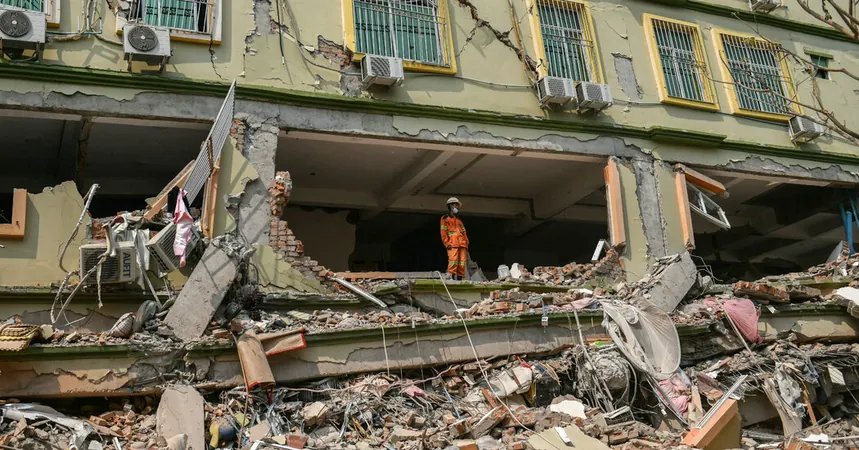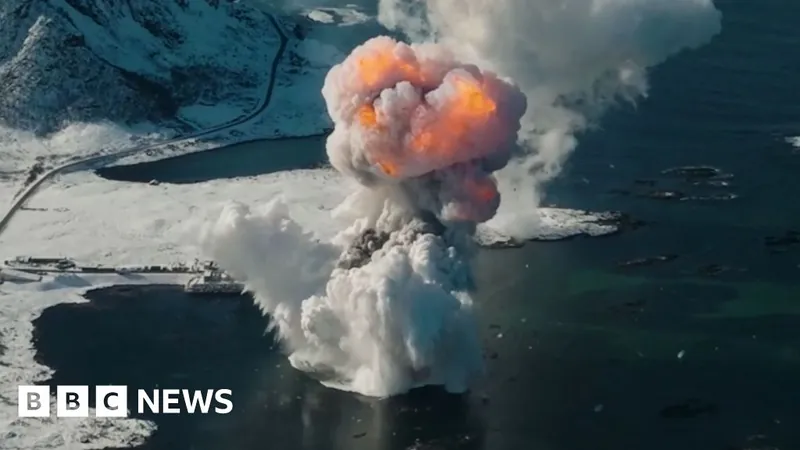
Catastrophic Myanmar Earthquake Claims Over 1,600 Lives: A Nation in Despair
2025-03-30
Author: Wei
The devastating earthquake that struck central Myanmar has claimed the lives of more than 1,600 people, as reported by the country's military leaders on Saturday. This disaster comes as the nation grapples with ongoing civil unrest, creating a dire humanitarian crisis.
The earthquake, which hit on Friday near Mandalay—the nation's second-largest city—has left a trail of destruction. Volunteers and rescue workers have been tirelessly searching through the rubble of collapsed buildings, including homes, temples, and community centers, hoping to find survivors. Rescuer Thaw Zin stated, “There are at least a hundred people still trapped inside. We are trying our best with what we have.”
This tragedy has caused public outrage against the military junta, which has struggled to maintain control amid increasing rebellion and unrest throughout Myanmar. The brutal civil war had already left nearly 20 million people—nearly half of the country's population—lacking adequate food and shelter prior to the quake, according to United Nations estimates. Adding to the chaos, military jets were reported to have carried out airstrikes in rebel-held territories on the same evening of the earthquake, further intensifying fears among civilians.
In light of the earthquake, the ruling military leadership declared a state of emergency across six regions, including areas controlled by opposition forces. Efforts to deliver much-needed aid are complicated by the ongoing conflict and logistical challenges. Humanitarian experts worry about potential military interference in aid distribution, particularly in rebel-held zones.
International responses have begun to trickle in. India has dispatched 15 tons of aid and over 100 medical professionals, with Prime Minister Narendra Modi framing this as assistance to a “close friend and neighbor.” Meanwhile, China's state media announced plans to send nearly $14 million in relief supplies, including water and medical kits. However, the response from wealthier nations remains uncertain, as sanctions imposed on Myanmar have hampered aid efforts.
Meanwhile, frustration is mounting among residents and volunteers. Observers have noted the military's presence at disaster sites, with unarmed civilians expressing their discontent over the lack of assistance. “We need helping hands and kind hearts, not soldiers with rifles,” lamented Thaw Zin.
As rescue operations move forward, conflicting reports and the emotional toll on the community remain high. In Mandalay, dozens of residents have mobilized to provide support. Yet, there are also harrowing stories emerging from the ruins. Survivors like Su Wai Lin, who was six months pregnant, shared tales of loss when her husband rushed back into their collapsing building to save an elderly neighbor but tragically didn’t make it out.
“My child will be born without a father,” she sobbed, offering a glimpse into the profound emotional impact this disaster has left on families across Myanmar.
As recovery efforts continue, the road ahead looks challenging. Many of the affected areas remain isolated due to destroyed infrastructure, and with the nation’s social fabric already frayed by civil war, the immediate needs for food, shelter, and medical help are desperate. The hope for survival dwindles as search operations are met with escalating despair. "Yesterday we found some survivors, but today the chances are much lower," Ko Thien Win reflected, encapsulating the feeling of hopelessness that permeates the affected communities.
This earthquake has exposed the fragileness of life in Myanmar and the extensive challenges faced in the wake of such a calamity—setting the stage for further unrest and suffering amidst a national crisis that is only just beginning to unfold. Will the international community respond in time to make a difference?



 Brasil (PT)
Brasil (PT)
 Canada (EN)
Canada (EN)
 Chile (ES)
Chile (ES)
 Česko (CS)
Česko (CS)
 대한민국 (KO)
대한민국 (KO)
 España (ES)
España (ES)
 France (FR)
France (FR)
 Hong Kong (EN)
Hong Kong (EN)
 Italia (IT)
Italia (IT)
 日本 (JA)
日本 (JA)
 Magyarország (HU)
Magyarország (HU)
 Norge (NO)
Norge (NO)
 Polska (PL)
Polska (PL)
 Schweiz (DE)
Schweiz (DE)
 Singapore (EN)
Singapore (EN)
 Sverige (SV)
Sverige (SV)
 Suomi (FI)
Suomi (FI)
 Türkiye (TR)
Türkiye (TR)
 الإمارات العربية المتحدة (AR)
الإمارات العربية المتحدة (AR)